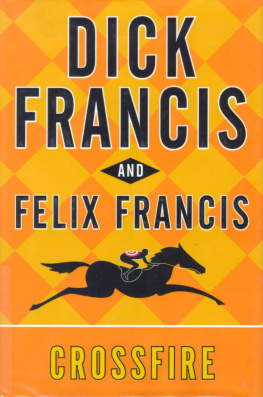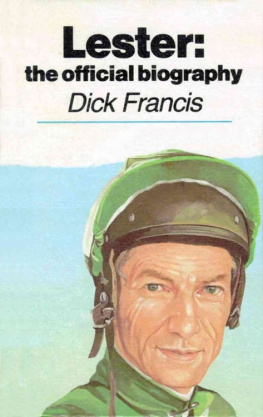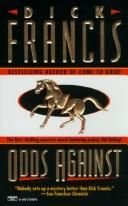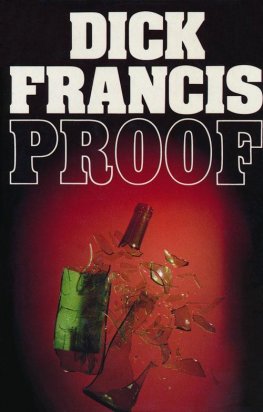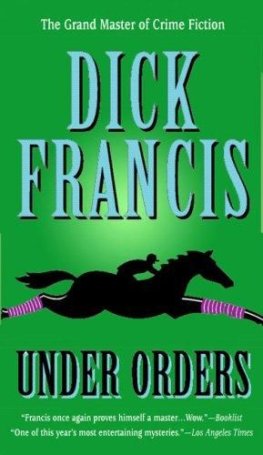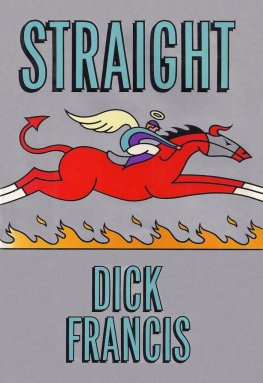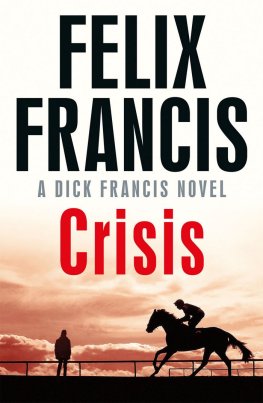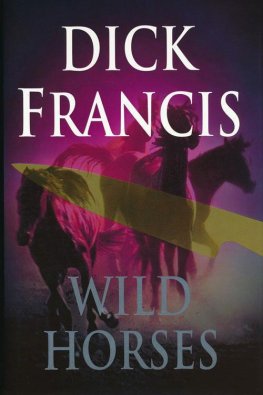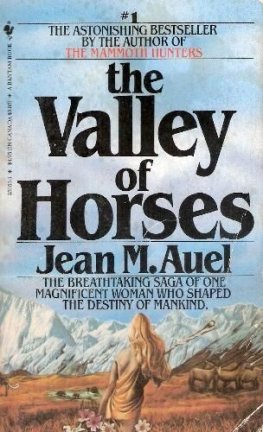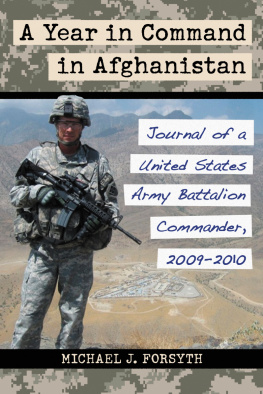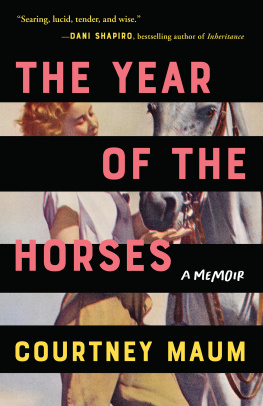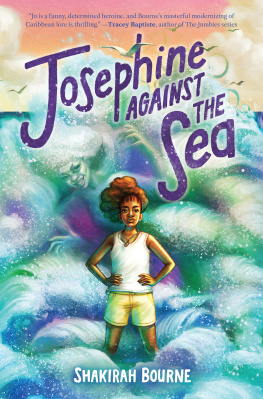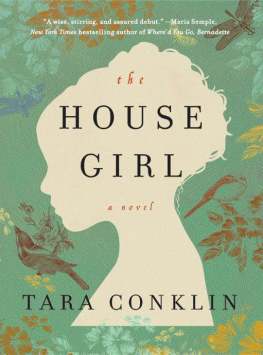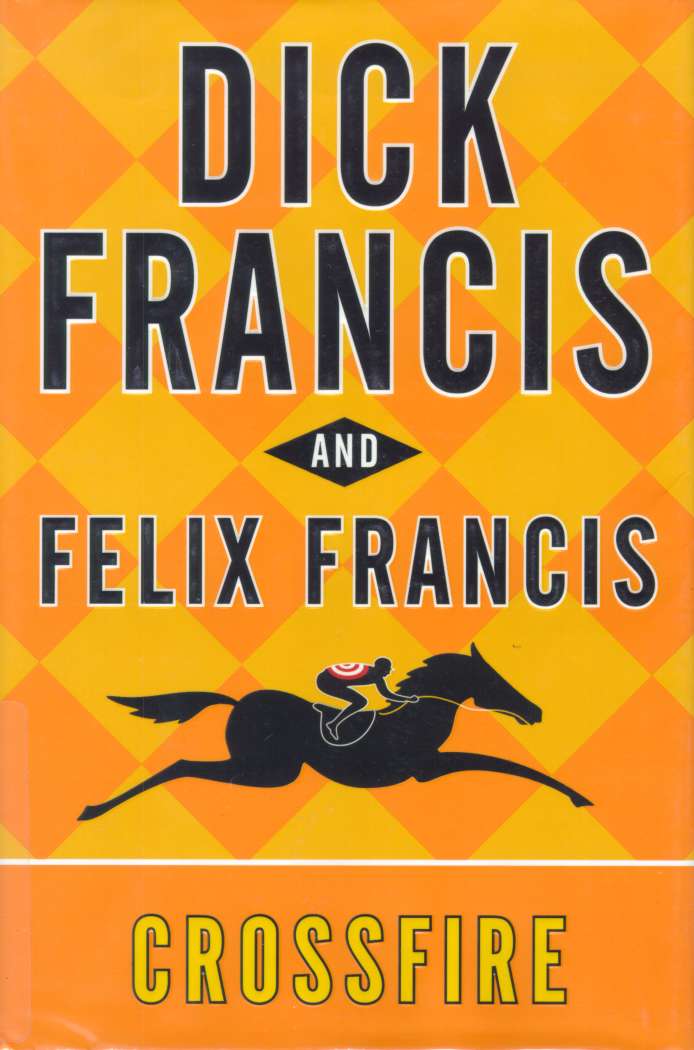
"Medic! Medic!"
Icould see that my platoon sergeant was shouting, but strangely, thesound of his voice seemed muffled, as if I was in a neighboring roomrather than out here in the open.
Captain Thomas Forsyth's tour ofduty in Afghanistan is cut brutally short when he's badly wounded by aroadside bomb. His world is torn apart by the injury; the army is hislife. Six months of leave to recuperate is a daunting prospect-but notas bleak as the probability of never rejoining his regiment.
Tomreturns to his childhood home in Lambourn, where his mother is aracehorse trainer and the "First Lady" of racing. Never having seeneye-to-eye with her, Tom doesn't expect a hero's welcome-but even he'snot prepared for the reception that awaits him.
When his mother'sprize horse finishes a vastly disappointing last in a race he shouldhave won, Tom discovers that the training busi ness is on the edge, andfacing a threat far more dangerous than a run of bad form. Tom findshimself on a very different, but just as deadly battlefield, whereagain his military skills are tested.... Kill or be killed?
DICKFRANCIS was one of the most successful postwar steeplechase jockeys,winning more than 350 races and riding for Her Majesty Queen Elizabeth,the Queen Mother. After his retirement from the saddle, he published anautobiography, The Sport of Queens, before going on to write more thanforty acclaimed books, including the New York Times bestsellers EvenMoney and Silks. A three-time Edgar Award winner, he also received theprestigious Crime Writers' Association's Cartier Diamond Dagger, wasnamed Grand Master by the Mystery Writers of America, and was awarded aCBE in the Queen's Birthday Honours List in 2000. He died in February2010, at age eighty-nine, and remains among the greatest thrillerwriters of all time.
FELIX FRANCIS is the younger of Dick Francis'stwo sons. Over the last forty years Felix has assisted with theresearch of many of the Dick Francis novels, not least Twice Shy,Shattered, and Under Orders. Since 2006, Felix has taken a moresignificant role in the writing, first with Dead Heat and thenincreasingly with the bestsellers Silks and Even Money. Crossfire isthe fourth novel of this father-and-son collaboration.
CROSSFIRE
DICK FRANCIS AND FELIX FRANCIS
G. P. PUTNAM'S SONS NEW YORK
Dedicatedto the men and women of the British forces who have lost limbs inAfghanistan. For them the battle is never over. And to the memory of
DICK FRANCIS
The greatest father and friend a man could ever have
Withloving thanks to William Francis, Lieutenant in the Army Air Corps,graduated from the Royal Military Academy, Sandhurst, August 2009,seconded to the Grenadier Guards at Nad-e-Ali, Helmand Province,Afghanistan, September to December 2009
CROSSFIRE
PROLOGUE HELMAND PROVINCE, AFGHANISTAN
OCTOBER 2009
Medic! Medic!"
Icould see that my platoon sergeant was shouting, but strangely, thesound of his voice seemed muffled, as if I was in a neighboring roomrather than out here in the open.
I was lying on the dusty groundwith my back up against a low bank so that I was actually half sitting.Sergeant O'Leary was kneeling beside me on my left.
"Medic!" he shouted again urgently, over his shoulder. He turned his head and looked me in the eyes.
"Are you all right, sir?" he asked.
"What happened?" I said, my own voice sounding loud in my head.
"A bloody IED," he said. He turned away, looked behind him, and shouted again. "Where's that fucking medic?"
AnIED. I knew that I should have known what IED meant, but my brainseemed to be working in slow motion. I finally remembered.IED-improvised explosive devices roadside bomb.
The sergeant was talking loudly into his personal radio.
"Alpha-four,"he said in a rush. "This is Charlie-six-three. IED, IED. One CAT A,several CAT C. Request IRT immediate backup and casevac. Over."
I couldn't hear any response, if there was one. I seemed to have lost my radio headset, along with my helmet.
"CATA," he'd said. CAT A was armyspeak for a seriously injured soldierrequiring immediate medical help to prevent loss of life. CAT Cs werewalking wounded.
The sergeant turned back to me.
"You still allright, sir?" he asked, the stress apparent on his face. "Yes," I said,but in truth, I didn't really feel that great. I was cold yet sweaty."How are the men?" I asked him.
"Don't worry about the men, sir," he said. "I'll look after the men."
"How many are injured?" I asked.
"Afew. Minor, mostly," he said. "Just some cuts and a touch of deafnessfrom the blast." I knew what he meant. The sergeant turned away andshouted at the desert-camouflaged figure nearest to him. "Johnson, goand fetch the bloody medic kit from Cummings. Fucking little rat's tooshit-scared to move."
He turned back to me once more. "Won't be long now, sir."
"You said on the radio there's a CAT A. Who is it?" He looked into my face.
"You, sir," he said. "Me?"
"The CAT A is you, sir," he said again. "Your fucking foot's been blown off"
1
FOUR MONTHS LATER
I realized as soon as I walked out of the hospital that I had nowhere to go.
I stood holding my bag at the side of the road, watching a line of passengers board a red London bus.
ShouldI join them, I wondered. But where were they going? Simply beingdischarged from National Health Service care had been my overriding aimfor weeks, without any thought or reason as to what was to come next. Iwas like a man released from prison who stands outside the gatesgulping down great breaths of fresh, free air without a care for thefuture. Freedom was what mattered, not the nature of it.
And I had been incarcerated in my own prison, a hospital prison.
Isuppose, looking back, I had to admit that it passed quite quickly. Butat the time, every hour, even every minute, had dragged interminably.Progress, seen day by day, had been painfully slow, with painful beingthe appropriate word. However, I was now able to walk reasonably wellon an artificial foot and, whereas I wouldn't be playing football againfor a while, if ever, I could climb up and down stairs unaided and wasmostly self-sufficient. I might even have been able to run a fewstrides to catch that bus, if only I had wanted to go wherever it wasbound.
I looked around me. No one had turned up to collect me, norhad I expected them to. None of my family actually knew I was beingdischarged on that particular Saturday morning and, quite likely, theywould not have turned up even if they had.
I had always preferred todo things for myself, and they knew it. As far as my family wasconcerned, I was a loner, and happier for it, perhaps the more so afterhaving to rely for months on others for help with my personal, andprivate, bodily functions.
I wasn't sure who had been the moreshocked, my mother or me, when a nurse had asked, during one of herrare visits, if she could help me get dressed. My mother had last seenme naked when I was about seven, and she was more than a littleflustered at the prospect of doing so again twenty-five years later.She'd suddenly remembered that she was late for an appointmentelsewhere, and had rushed away. The memory of her discomfort had keptme smiling for most of the rest of that day, and I hadn't smiled muchrecently.
In truth, 25198241 Captain Thomas Vincent Forsyth had not been the most patient of patients.
Thearmy had been my life since the night I had left home after anotherparticularly unpleasant, but not uncommon, argument with my stepfather.I had slept uncomfortably on the steps of the army recruiting office inOxford and, when the office opened at nine a.m. the following morning,I had walked in and signed on for Queen and Country as a privatesoldier in the Grenadier Guards.
Guardsman Forsyth had taken toservice life like the proverbial duck to water and had risen throughthe ranks, first to corporal, then to officer cadet, at the RoyalMilitary Academy, Sandhurst, followed by a commission back in my oldregiment. The army had been much more to me than just a job. It hadbeen my wife, my friend and my family; it had been all I had known forfifteen years, and I loved it. But now it appeared that my army careermight be over, blown apart forever by an Afghan IED.

